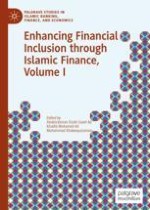2020 | OriginalPaper | Buchkapitel
8. Improving Access to Financial Services: Theory and Practice Around the Globe
verfasst von : Muhammad Azeem Qureshi, Toseef Azid
Erschienen in: Enhancing Financial Inclusion through Islamic Finance, Volume I
Aktivieren Sie unsere intelligente Suche, um passende Fachinhalte oder Patente zu finden.
Wählen Sie Textabschnitte aus um mit Künstlicher Intelligenz passenden Patente zu finden. powered by
Markieren Sie Textabschnitte, um KI-gestützt weitere passende Inhalte zu finden. powered by
